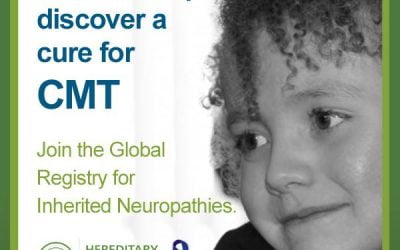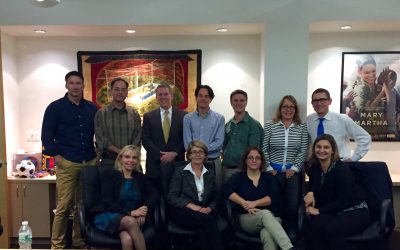 The National Organization for Rare Diseases (NORD)—an independent charity that built its natural history study platform for rare diseases and is supported by a cooperative agreement by the U.S. Food and Drug Administration (FDA)—has awarded HNF funding to build a robust natural history study to support the second most common type of CMT called hereditary neuropathy pressure palsies (HNPP).
The National Organization for Rare Diseases (NORD)—an independent charity that built its natural history study platform for rare diseases and is supported by a cooperative agreement by the U.S. Food and Drug Administration (FDA)—has awarded HNF funding to build a robust natural history study to support the second most common type of CMT called hereditary neuropathy pressure palsies (HNPP).
This study will also include the rarer types of CMT including HNPP, CMT2A with visual impairment/optic atrophy, CMT2C, LMNA mediated AD-CMT2, CMT4, CMT4A, 4B1, 1B2 & 4B3, 4C, 4D, 4E, 4F, 4G, 4H, 4J, CMT6, Autosomal Dominant Optic Atrophy ADOA (OPA1) and Giant Axonal Neuropathy (GAN). These rarer types often have unique and severe symptoms that may be fatal.
HNF is proud to be one of twenty leading rare disease groups selected for this NORD initiative. HNF sees great opportunity in partnering with NORD to fill the research gaps that can lead to a better understanding of how these rare diseases progress over time.
Natural history studies are imperative in our understanding of rare diseases like CMT. Identifying the more unique symptoms among CMT patients—such as optic atrophy (including vision impairment and blindness), hand tremors, vocal cord paresis, hearing loss, and cognitive deficits—can produce the vital information needed for clinical trial design.
Currently, there is no cure for CMT/IN, but clinical trials for the most common type CMT1A are underway.
Allison Moore, HNF founder and CEO—who herself has CMT1A, as do several members of her family—emphasizes the need to turn our attention to the rarer forms of CMT:
“For the rarer forms of CMT, which often have very severe symptoms, there is less hope for treatments and cures. I am passionate about ensuring that all types of CMT/IN have pipeline drugs and gene therapies to support the patient community. Collecting patient reported information will be invaluable and will be made available to any researcher or drug or gene therapy developer interested in creating therapies for CMT.”
The new Natural History Study is part of HNF’s Charcot-MarieTooth Research Network (CMTRN), enabling us to provide a complete picture of each patient’s experience with CMT/IN. HNF is launching this initiative to help identify patients with HNPP and the more rare forms of CMT/IN.
To date there is very little data on the rare forms of CMT/ IN, and finding patients all over the world is critical in therapy development. If you are a patient or a family member (or know someone with CMT/IN), please join this critical study.
The goal is to enroll as many patients as possible. Joy Aldrich, HNF advocacy director and moderator for HNF’s Inspire Online Support Group, states:
“The success of this natural history study is dependent upon community participation: we need all CMT/IN patients to participate.”
Debi Houliares, community advocate, HNF board member, and mother of a son with a rare form of CMT adds:
“As the mother of a son with CMT6, it is so exciting to see our community having access to a study that not only includes the rarer forms of CMT, but enables us to track these diseases over time to identify and validate the daily physical and quality of life challenges we know we are struggling with — but have yet to have had a way to document and quantify these challenges in any sort of productive, scientific way for future research.”
The CMTRN supports natural history studies via electronic surveys that collect patient experience and disease progression information. Patients (or their caregivers or guardians) can enter information from anywhere in the world. The data is made anonymous and stored securely in an online portal. HNF can share the data with individuals or institutions conducting research or clinical trials, but cannot share any personally identifying information. This format is approved by the study’s governing board, which includes scientists, healthcare providers, and patient advocates.
NORD president and CEO Peter L. Saltonstall says:
“NORD’s natural history studies platform empowers patients and families to drive research and eliminate some of the unknowns that still exist in rare diseases. We are glad to be working with the Hereditary Neuropathy Foundation, one of our member organizations, on this project, and we thank the FDA for its support and on-going commitment to help people with rare diseases.”
HNF is excited to be a part of NORD’s Natural History Studies Project.
BE SURE TO SIGN UP SO WE CAN MAKE THIS STUDY AS EFFECTIVE AS POSSIBLE AND HELP ENCOURAGE OTHERS TO PARTICIPATE AS WELL! https://cmtrn.iamrare.org/







Is it still possible to join the study group? I just learned of it.
My daughter has CMT type 6.
CMT4a